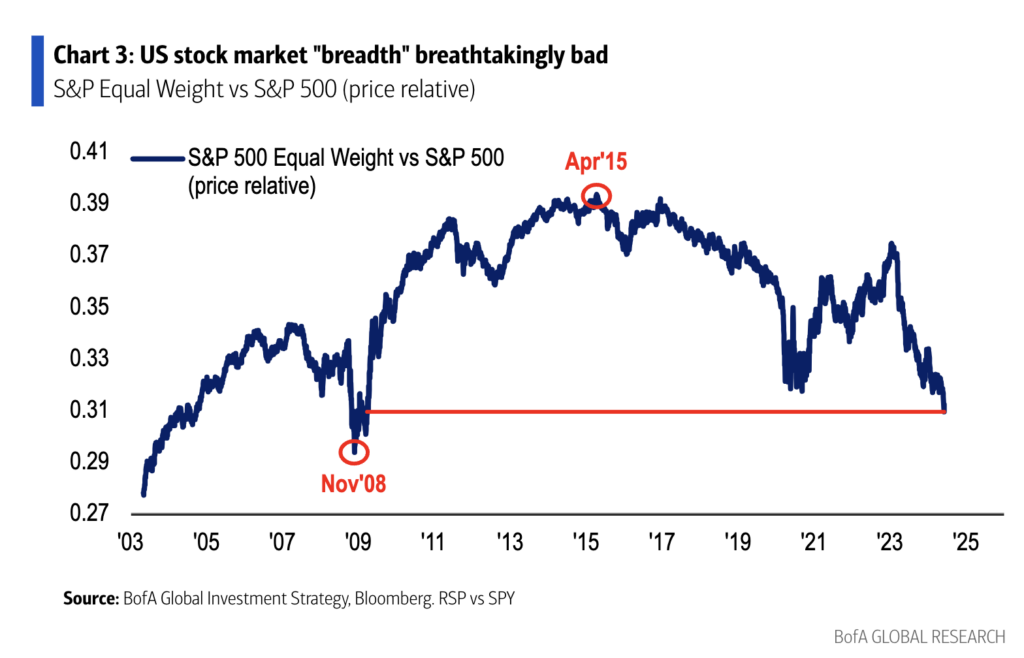Zinger Key Points
- Michael Hartnett, BofA chief investment strategist, turns bullish on bonds for the second half of the year.
- He advises investors to "buy any dip in bond prices" and "sell the first cut" for stocks.
- How to Spot the Market Bottom: Matt Maley has navigated every major market turn in the last 35 years, and on Wednesday, March 26, at 6 PM ET, he’s revealing how to recognize when the worst is over, the trades to make before the next bull market takes off, and the stocks and sectors that will lead the recovery.
Bank of America Chief Investment Strategist Michael Hartnett has turned bullish on bonds for the second half of the year, while raising heightened risks of a stock market sell-off as investors bet on the first Fed interest rate cut.
Hartnett, known for his bold contrarian market views, reiterated in his latest “The Flow Show” report that the “anything-but-bond” trade will play out for the remainder of the year.
According to Hartnett, a slowing economy will reduce the currently elevated equity valuations. Additionally, with fiscal policy expected to become more conservative in 2025, current market fears regarding bond yields are likely to ease.
He advised investors to “buy any dip in bond prices,” while recommending to “sell the first cut” for stocks.
Earlier this month, Hartnett suggested the 30-year US Treasury provided “the best hedge for weaker nominal growth.”
The Worst Equity Market Breadth Since 2009

Chart: Bank of America Securities
Despite many investors and analysts on Wall Street believing that a Fed rate cut would further sustain the stock market rally, Hartnett’s counterintuitive call is based on a detailed analysis of the so-called “market breadth.”
Hartnett highlighted that the Equal Weight S&P 500 Index, tracked by the Invesco S&P 500 Equal Weight ETF RSP, is trading at its lowest relative to the cap-weighted S&P 500 Index, tracked by the SPDR S&P 500 ETF Trust SPY, since March 2009.
According to Hartnett, “the worst stock breadth since March ’09” is a warning sign, reflecting the extreme market dominance of a few tech giants, namely Magnificent Seven.
“AI crowds out Wall St & Main St dollars,” Hartnett wrote in the note.
He reminded investors that since 2020, there has been “pain trade after another” and predicted that the next trend will be “value outperforming growth” stocks, with “breadth winning” as economic growth slows.
A Benign PCE Failed To Support “Wobbly Tech”
The catalyst for this shift would be a benign April Personal Consumption Expenditure (PCE) report, which turned out to be unable to “support wobbly tech,” according to Harnett.
This appears to be the case, as on Friday, May 31, the Fed’s favorite inflation gauge came in as expected, alleviating fears of a reawakening in price pressures.
Despite this, the Nasdaq 100 index, tracked by the Invesco QQQ Trust QQQ, tumbled 1.4% during midday trading in New York. As a result, tech stocks are set to snap a five-week winning streak.
You were right, Michael.
Photo: Funtap on Shutterstock
Edge Rankings
Price Trend
© 2025 Benzinga.com. Benzinga does not provide investment advice. All rights reserved.
Trade confidently with insights and alerts from analyst ratings, free reports and breaking news that affects the stocks you care about.